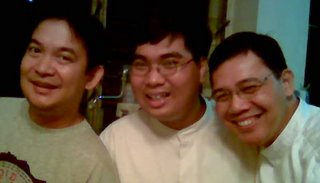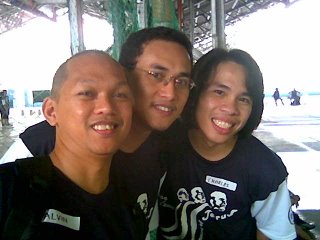
2 July 2006: 13th Sunday of the Year
The Gospel contains all elements of tragedy. Jairus’ daughter was at the brink of death and a woman was suffering from hemorrhage for 12 years. And Jesus healed all of them. Healing is part of normal Christian life. Since the
Why? Because our faith is incarnational. God cares as much about the body as he does the soul, as much about the emotions as He does the spirit. The redemption of Jesus is total, involving every aspect of the person --- body, mind, spirit. Everything in us. All of us. God employs an infinite variety of means to bring health and well-being to his people: doctors, psychiatrists, priests. Nowadays, we often compartmentalize ourselves, and assign someone to cure each compartment: for our bodies, the doctors; for our mind, the psychologists, for the spirit, the priests. But the ancient Hebrews regarded persons as a whole, a unity. He who cures the body, cures the mind, and the soul. He who cures the soul, cures the mind and the body, and so on.
And thus, the refusal to use medical means to promote healing may be a gesture of faith — but more often a gesture of spiritual pride. On the other hand, a total trust on medicine alone; may be a gesture of our rationalistic attitude — and then, turn to prayer only when everything else has failed. Normally, the aid of prayer and the aid of medicine should be used at the same time and with equal vigor, for both are gifts of God, both are His ways of healing. I have known several Jesuits who are doctors. One of them said that he wanted to totally heal the sick, but unless there is the aspect of the spiritual, his medical practice is incomplete.
A normal way but effective method is our touch therapy. We find it in scripture. It is called the laying of hands. It is a gesture of compassion. Jesus laid hands on the sick at
The laying of hands in itself does not heal the sick—it is Christ who heals. By employing our hands, God gives us the opportunity to impart healing.
Based from Scripture we find these steps helping in healing.
First, listen to them: the step of discernment. Listen to people share their deepest need and listen to God to show the key to the problem. Often, the root of the problem is sorted out once people have let out steam, when they have talked and talked and talked. And often the key to the problem because clearer as one articulates their wounds.
Second, ask: knowing the key to the problem. Ask clearly from God what is needed without ifs, buts, and ands.
Third, believe: believe with the whole person. If not, say, “I believe. God help me with my unbelief!”
Fourth, give thanks: simple courtesy leads us to give thanks for what we have asked to happen. Gratitude heals. When we are overwhelmed with gratitude, we are filled with energy and vigor.
Today, we acknowledge our gift of healing and the importance of touch in our lives. If we would humbly seek our deepest desires, it is the desire to be embraced, to be touched and comforted, to be loved palpably. And when someone touches us, all wounds are miraculously healed. Let us not deny each other the importance of touch. We can heal. It is part of our Christian life. It is Let us not withhold our touch from those who need it.













